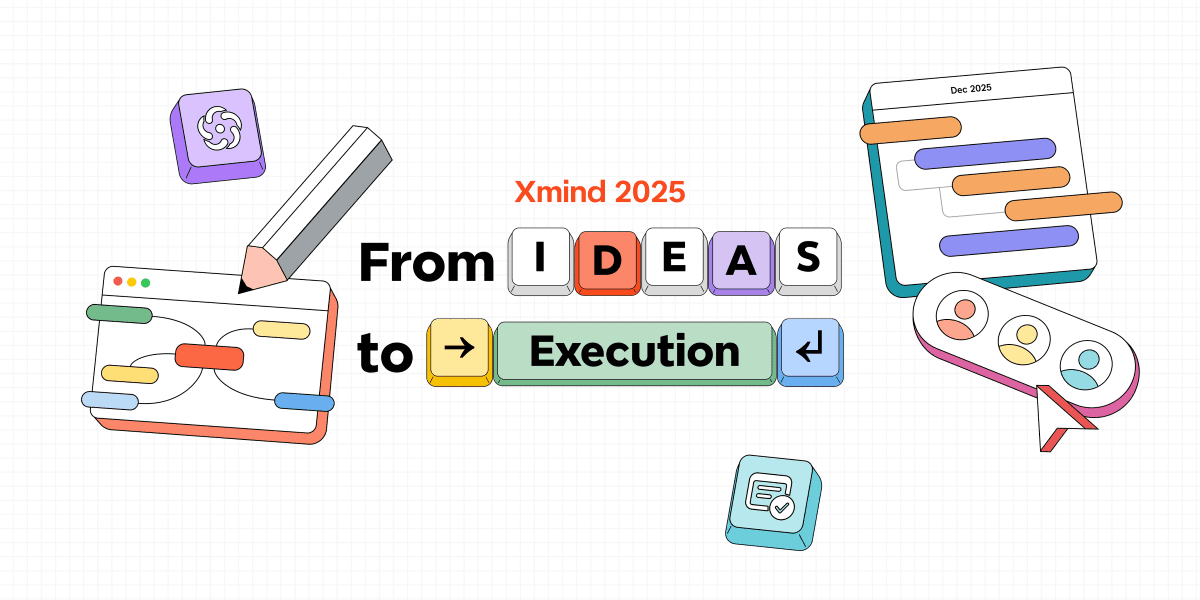Aug 14, 2025
Top 5 in-demand project management skills in 2025

Hannah
Efficient project management skills are essential in today’s competitive business landscape. Whether you are an experienced manager or a newcomer just stepping into the field of project management, mastering the most in-demand project management skills is key to standing out. These skills not only help you guide teams but also improve performance, reduce risks, and achieve business goals.
In this guide, we’ll explore the top 5 project management skills for 2025, with practical examples, techniques, and tools such as Xmind you can make full use of. Let’s get started on building the skills needed for project management success.
Overview of top 5 skills for a project manager and their importance
Leadership & Strategic thinking
Definition: Leadership is the capability to inspire, guide, and motivate a team toward shared goals. Strategic thinking is the ability to evaluate situations, anticipate challenges, and align decisions with long-term objectives.
Importance: These are fundamental skills for a project manager, enabling them to lead with clarity and confidence. Strong leadership keeps teams engaged and aligned, while strategic thinking ensures that every decision supports the project’s vision. Together, they empower managers to navigate complex situations and deliver results that match or exceed expectations.

Communication & Stakeholder management
Definition: Communication is the process of exchanging information clearly and efficiently across teams and stakeholders. Stakeholder management involves identifying, engaging, and maintaining positive relationships with all parties involved in a project.
Importance: They are core skills needed for project management and influence every stage of the process. Effective communication ensures alignment, prevents misunderstandings, and fosters trust. Strong stakeholder management keeps all contributors engaged and invested, leading to smoother workflows and better project outcomes.

Agile & Adaptive planning
Definition: Agile planning focuses on iterative progress, flexibility, and responsiveness to change. Adaptive planning builds on this by maintaining project structure while accommodating evolving priorities.
Importance: Agile and adaptive planning are valuable project management skills and techniques, allowing project managers to pivot without losing control, maintaining efficiency even when faced with shifting goals or unexpected challenges. This flexibility is key to ensuring timely delivery without compromising quality.
Data-driven decision making
Definition: Data-driven decision making involves using accurate, relevant, and timely data to guide project actions.
Importance: Decisions based on data help managers anticipate risks, track progress, and optimize resources. This leads to more accurate forecasting, better financial control, and stronger overall project success rates.
Risk management & Problem-solving
Definition: Risk management is the process of identifying potential threats before they occur. Problem-solving involves developing effective solutions when challenges arise.
Importance: By proactively addressing risks and resolving issues quickly, project managers can protect project timelines, maintain budgets, and safeguard stakeholder confidence. These skills are vital for sustaining long-term professional credibility.

How to do project management skills training
Step 1: learn through real projects
You should first explore a real project management example to understand how the skills needed for project management are applied in practice. In this step, Mind Mapping is a very helpful tool for organizing your thoughts and structuring your ideas.

Step 2: master project planning tools
Using AI-powered mind mapping tools can help product managers master project management skills faster and more efficiently.
Project initiation stage
Automatically generate project frameworks: Input project goals or requirement documents, and let AI create an initial mind map structure.

Idea brainstorming: AI suggests additional ideas and industry examples based on the topic to quickly expand thinking.

Planning & design stage
Automated task breakdown (WBS): AI decomposes high-level goals into actionable sub-tasks.
Timeline & priority recommendations: AI suggests Gantt charts and milestones based on task dependencies and workload.
Risk analysis: AI highlights potential schedule bottlenecks and proposes mitigation strategies.
Execution & tracking stage
Cross-tool integration: AI syncs mind map tasks directly to Trello, Asana, Jira, and other tools.
Automatic progress updates: AI updates mind map statuses based on team feedback or system data.
Progress alerts: AI notifies managers of delays or risks and suggests plan adjustments.
Step 3: continuous improvement
The importance of project retrospectives should not be underestimated. It is an important factor of continuous improvement in project management skills.
Procedure:
Define the objective—Clarify whether the goal is to capture lessons learned, identify issues, or optimize processes.
Gather information—Collect project data, documentation, and team feedback.
Analyze the process—Identify successes, problems, and their root causes.
Develop action items—Propose actionable improvements and assign responsibilities.
Document results—Use Xmind to create a retrospective mind map, then export and archive it in the knowledge base.
Follow up on improvements—Verify the effectiveness of actions in future projects.

Conclusion
In 2025, mastering core project management skills is essential for success in any industry. Whether leading complex initiatives or managing smaller projects, the ability to communicate clearly, adapt quickly, and solve problems effectively will set you apart. Employers increasingly look for specific project management skills to list on resume—skills that prove you can lead teams, meet deadlines, and deliver results.
Try to leverage tools like Xmind to make these project management skills easier to learn. They can help you organize ideas, map strategies, and visualize processes. By refining your abilities and showcasing them in both practice and on your resume, you position yourself as a capable, adaptable professional ready to handle evolving challenges. The key to thriving in the years ahead is to treat project management as a dynamic skillset—one that grows with every project you lead.






